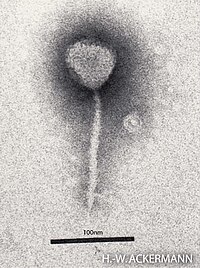
Photo from wikipedia
In mice, zygotic genome activation (ZGA) occurs in two steps: minor ZGA at the one–cell stage and major ZGA at the two–cell stage. Regarding the regulation of gene transcription, minor… Click to show full abstract
In mice, zygotic genome activation (ZGA) occurs in two steps: minor ZGA at the one–cell stage and major ZGA at the two–cell stage. Regarding the regulation of gene transcription, minor ZGA is known to have unique features, including a transcriptionally permissive state of chromatin and insufficient splicing processes. The molecular characteristics may originate from extremely open chromatin states in the one–cell stage zygotes, yet the precise underlying mechanism has not been well studied. Recently, the R-loop, a triple–stranded nucleic acid structure of the DNA/RNA hybrid, has been implicated in gene transcription and DNA replication. Therefore, in the present study, we examined the changes in R-loop dynamics during mouse zygotic development, and its roles in zygotic transcription or DNA replication. Our analysis revealed that R-loops persist in the genome of metaphase II oocytes and preimplantation embryos from the zygote to the blastocyst stage. In particular, zygotic R-loop levels dynamically change as development proceeds, showing that R-loop levels decrease as pronucleus maturation occurs. Mechanistically, R-loop dynamics are likely linked to ZGA, as inhibition of either DNA replication or transcription at the time of minor ZGA decreases R-loop levels in the pronuclei of zygotes. However, the induction of DNA damage by treatment with anticancer agents, including cisplatin or doxorubicin, does not elicit genome-wide changes in zygotic R-loop levels. Therefore, our study suggests that R-loop formation is mechanistically associated with the regulation of mouse ZGA, especially minor ZGA, by modulating gene transcription and DNA replication.
Journal Title: International Journal of Molecular Sciences
Year Published: 2022
Link to full text (if available)
Share on Social Media: Sign Up to like & get
recommendations!